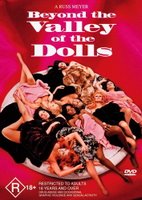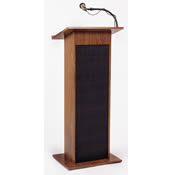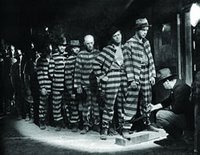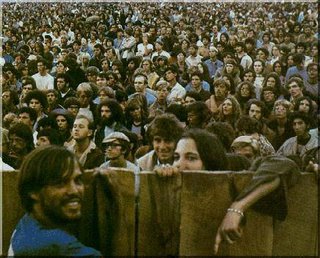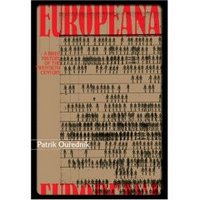Fret not! The title of this post notwithstanding, I'm not about to lay some heavy jive on you about the dream-world of Leo Strauss and his trained monkeys. No portrait of that deeply-wounded man's ghastly ideal republic follows. Instead, I've chosen to ask Sir Thomas More, author of that great classic of Renaissance literature, Utopia, what he has to say about the political situation in which we find ourselves today.
What? How did I manage to interview the long-dead Chancellor to Henry VIII? I don't want to go into all the gory details just now, but suffice it to say that it had something to do with the lovely and talented Valerie Archambeau's absence this week. She's in Paris, being important and cool and emailing me about her frequent, expense-account driven trips to chic restaurants, while I schlep entropically on here in Chicago. Those of you who know me know what happens when Valerie's out of town, and it isn't pretty: picture the poet in his tattered terry-cloth robe up late, smoking White Owl Cigars, slugging back SoCo from a pocket flask, and obsessively gambling online and you'll get a picture of my spiritual, if not exactly my literal, state of being. So anyway, long story short, I think the slice of ancient pizza I chorfed down before drifting off in front of A Man for All Seasons may have had something a little nasty growing on it, something that allowed me to drift off into the Visionary World of Lucid Dreaming, in which I met our man, Sir Thomas More. No, really.

Anyway, after drifting off I seemed to wake in some kind of luxurious yurt or pavillion, whose tent-flap opening revealed hints of a scenery both lush and harmonious etc. From outside issued lute-notes of exquisite sweetness, and the love-yelps and giggles (no less sweet) of maidens and swains cavorting to the tambour's gentle rum-tee-tum-tum etc. Rising from my palfrey or palanquin or whatever the hell you call those renaissance daybeds, I made for the door, heedless of the impression I might make on the inhabitants beyond, clad as I was in the soiled terrycloth garmet of my temporary bachelorhood. Imagine my dismay, though, when a strong hand clutched my shoulder from behind, and a stern voice spoke out with virile clarity, saying: "Who the hell let you into my yurt?" Turning, I stood amazed: for my questioner was no other than the mighty More himself, all in ermine clad etc.
Archambeau: Uh. Right. Sorry. I'll just be leaving now, out to where the tambour-playing maidens are frolicking. Nice palanquin, by the way. Really lovely. Must be going, though.
 More: Not so fast, unshaven interloper! I see by the remote control in your bathrobe pocket that you come to this Arcadia from a benighted time! No doubt the gods have sent you here to receive my coucil. Have a seat on that palinode, or on the pailing or palisade if that's more comfortable. No -- not there, cullion! The palfrey's for special company.
More: Not so fast, unshaven interloper! I see by the remote control in your bathrobe pocket that you come to this Arcadia from a benighted time! No doubt the gods have sent you here to receive my coucil. Have a seat on that palinode, or on the pailing or palisade if that's more comfortable. No -- not there, cullion! The palfrey's for special company.
Archambeau: Oh, right. Special company. Well, I'll just step outside then, and see if the cavorting maidens know of a more suitable place for me to crash, then...
More: Enough! Sit, sir! I see from your glazed eyes and tousled mane, yea I see from the cheese-fry in your beard that you need guidance, that you may take it back to your people in this their troubled time. I know the very thing! Ophelia! Deliah! Juliana! Bring in the mighty tome!
In answer to More's shout, several comely lasses with tresses fair and eyes that shone with the light of suns, a dainty troupe of graces with hairs of golden-wire and the scent of sweet gillyflowers etc. traipsed in, snuggling up to More like a favorite uncle, and deposited a bejewelled folio (or perhaps it was a gold-encrusted quarto, or a bedazzling codex, I can't remember which) into his waiting hands. "Nice bathrobe," said one of the nymphs, taking my lapel in her delicate fingers before tracing them gently down my sleeve, letting the ever-so-slightly-pink-and-plump, indeed cherubic, hand linger for the slightest of most enticing moments before she traipsed out through the tentflap and into the lute-and-tambour echoing glades where the gentle doe doth nuzzle 'neath the waterfall's warm and gentle spray etc.
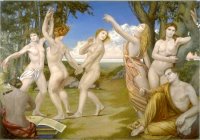
More: Quit staring at her snow-white bosom fair, you base and low-born ogling knave! We're on a mission here, already. And aren't you married?
I shuffled my feet and looked at the richly carpeted and be-tapestried floor, before mumbling a shame-faced "how'd you know?"
More: Just look at you. Unshaven, crazy-haired, wrapped in a bathrobe of unspeakable condition, with a half-eaten slice of moldy pepperoni and onion sticking out of your pocket. A single man living your life would never have reached your advanced age, good cullion, so a philosopher might well reason that you're a man of marriage, but one whose fair bride has stepped out for a few days. Long enough for you to get covered in cigar-ash, anyway. And... [he paused, to sniff the perfumed air] ... and something other than our customary myrrh and viburnum taints the air. When's the last time you showered?
Thanks be to Charles Schultze's Pigpen, patron saint of all husbands on their own for a week, he didn't press the question, but ambled over to a nearby lectern and cracked open the jewel-encrusted codex.
More: Now, let's see...
[At this point he licked his index finger and began leafy furiously backwards and forwards through the book, pausing to squint every now and then, or peer closely into the book, his nose nearly touching the vellumated sheets of the tome.]
More: Ah! The very passage! Well. Looking you over, my base and debilitatingly shaggy intruder, I see that you wear the garb of the American male in those early years of the twenty-first century. Moreover, judging by the unbearable harshness of your vowels, indeed, by the way your every word grates upon my ear with the sound of a rusty trombone being sawn in half by a particularly unskilled chimpanzee, I divine that you hail from the midwestern zone of that mighty continent. I reason, therefore, that you have been thrust into my tent to bear back urgent advice to your King George on this, his current war. Is this not so?
Before I could raise my voice in feeble protest against what seemed a dreary fate, perching on a palanquin or palinode while all the youths and maids cavorted tambour-wise in the palace of pleasant breezes visible just beyond the glade of a thousand delights outside, he continued in his booming and prophetic tones.
More: So. Here it is. Some dialogue of that great traveler Raphael Hythlodaeus, which I had the great wisdom and foresight to record in my immortal Utopia. Check it out, oh base and debased rough-clad cur. I believe your King will be grateful when you bear these honey-sweet words of steely wisdom to his fairly-curving, regal ear. Here's a good bit about the advice old Raphael would offer to the King of France, should that august lord find himself overextended and be-quagmired in a fruitless war against the dread Italians. Here the words!
He gestured grandly skyward with his right hand, continuing with as much dignity as possible considering his ministerial rings got caught up in the cloth-of-gold filigree of the ceiling tapestry. Staring me down lest I chuckle indecorously, at length he quoted from out that gilded folio's richy calligraphed and fine-limned pages etc:
Now when things are in so great a fermentation, and so many gallant men are joining councils, how to carry on the war, if so mean a man as I should stand up, and wish them to change all their councils, to let Italy alone, and stay at home, since the Kingdom of France was indeed greater than could be well governed by one man; that therefore he ought not to think of adding others to it: and if after this, I should propose to them the resolutions of the Achorians, a people that lie on the southeast of Utopia, who long ago engaged in war, in order to add to the dominions of their prince another kingdom, to which he had some pretensions by an ancient alliance. This they conquered, but found that the trouble of keeping it was equal to that by which it was gained; that the conquered people were always either in rebellion or exposed to foreign invasions, while they were obliged to be incessantly at war, either for or against them, and consequently could never disband their army; that in the meantime they were oppressed with taxes, their money went out of the kingdom, their blood was spilt for the glory of their King, without procuring the least advantage to the people, who received not the smallest benefit from it even in time of peace; while their King, distracted with the care of two kingdoms, was the less able to apply his mind to the interests of either.
Of a sudden I felt a sharp sting across my cheek: More had flung some kind of fustilarian gidget or flirt-gill at me. "Yo! Paunchy maggot-pie! Listen up!" he growled menacingly. I let drop the tent-flap I'd surreptitiously lifted, that I could gaze outward at the cavorting calves of the pale-and-pinkish nymphs and dryads, and resumed the posture of the dutiful academic listener, nodding frequently and stroking my beard in concerned thought, in the process dislodging the errant cheese-fry from where it rested. It lay on his richly-carpeted mille-fleures floorcloths like an accusation of sloth and debasement, until I kicked it beneath the palinquin. Oblivious to my subterfuge, More continued reading aloud:
When they saw this, and that there would be no end to these evils, they by joint councils made an humble address to their King, desiring him to choose which of the two kingdoms he had the greatest mind to keep, since he could not hold both; for they were too great a people to be governed by a divided king, since no man would willingly have a groom that should be in common between him and another. Upon which the good prince was forced to quit his new kingdom to one of his friends (who was not long after dethroned), and to be contented with his old one. To this I would add that after all those warlike attempts, the vast confusions, and the consumption both of treasure and of people that must follow them; perhaps upon some misfortune, they might be forced to throw up all at last; therefore it seemed much more eligible that the King should improve his ancient kingdom all he could, and make it flourish as much as possible; that he should love his people, and be beloved of them; that he should live among them, govern them gently, and let other kingdoms alone, since that which had fallen to his share was big enough, if not too big for him. Pray how do you think would such a speech as this be heard?
"So," uttered More, with immense satisfaction. That's that, then. You'll convey the message to your Lord and King, George the Mumbler?
Archambeau: You want I should tell George Bush to choose between his two kindgoms?
More: Oh, milk-livered barnacle with your tattered terrycloth! No! Infer a little, won't you? I want you to tell George Bush to move to his precious new kingdom, the one he thought so well of that he'd spill his soldiers' blood and bleed his treasury pale as a dryad's nether-thigh! Tell him to bring home his soldiers and, since the people of his new kingdom will, in his own prophetic words, greet him as their liberating savior, tell him to go there himself and rule with his characteristic moderation and wisdom. Think, man! There's a good lad.
It was then that the faintest spark lit up, short-circuit like and low-wattage, in the back depths of my mind. There, behind all of the "remember the dry cleaning" urgencies and "pack your keys, pack your keys, don't forget to pack your keys" inscriptions, a dusty box opened, a box labeled "English 211, Lake Forest College." From said box issued forth the faint memory that Raphael, the traveler who'd so regaled Sir Thomas Moore, had gone on to say that there was no point in an intellectual going public and trying to influence his king. I said as much to More, who protested that Raphael was a weak-kneed fool, and bald of pate, to boot. He, the great Thomas More, has been a great mind of his age, and an adviser to no less Invincible and Sublime a Monarch than Henry of England, the eighth to bear that stout and storied name.
"How'd that work out for you?" I asked, noting the slight crease around More's neck, the only sign left in this arcadian afterlife to indicate the nature of his untimely death by the blade of Henry's executioner. He flushed first red, then richly purple, then white and a kind of odd greenish yellow. He trembed a moment in princely rage, the force of his limbs in their restraint seeming that of a thousand stallions in goodly devise and apparel etc. Then, his rage past, he looked up, a little sheepishly.
More: Right, right, and right you are, foul-smelling dunderhead. Let us off, then, after all, and have a tumble with the tambour-playing nymphs, whose gentle bells do jangle with the sound of their most naked and unclothed and youthful frolic. He flung the tent flap wide and strode out with me in tow.
But just then, from the depth of my bathrobe's pocket, from deep beneath the pizza crust and White Owl stub, my cell phone rang. The special ring that could only indicate my wife, calling from across the sea. I woke from my vision, with much delight. Around me sprawled my own wide world, with all its delights and urgencies.







